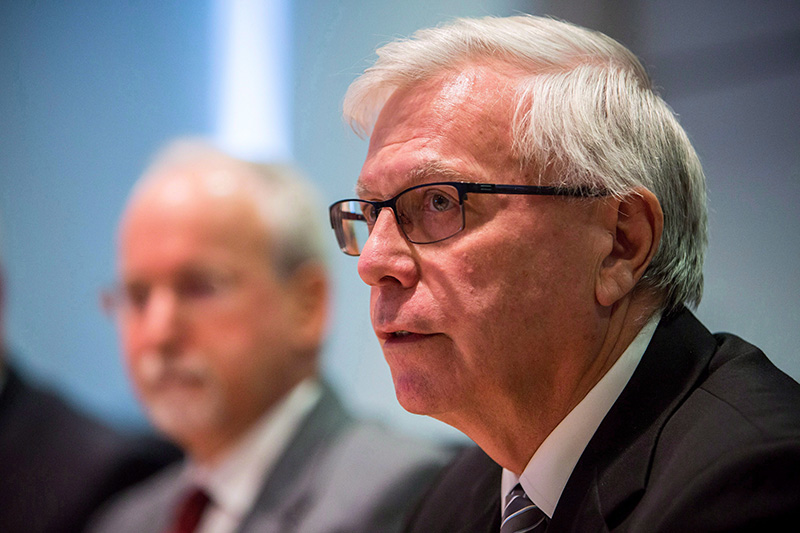A top official at the British Columbia legislature has chosen to retire after an independent report released Thursday concluded he had engaged in misconduct in the course of his employment.
And a second official who in the May 2019 report by retired Supreme Court of Canada chief justice Beverley McLachlin was found not to have done anything improper remains on paid leave while three other investigations continue, including one by the police.
“I’m happy with the conclusions of McLachlin’s report,” said Speaker Darryl Plecas, whose concerns led to the review. “I think it says that the issues that I had raised were accurate. Of course it’s not everything, but I’m reminded that her terms of reference were very narrow, so there’s a number of things that weren’t considered.”
Craig James released a statement saying he was retiring as clerk after 32 years working for the legislative assembly and has fond memories of the people and the institution.
“But I have had enough,” he said. “I have been publicly ridiculed and vilified. My family has been deeply hurt and continues to suffer humiliation. In an effort to put an end to that, I have decided to retire, and reach a settlement with the Legislative Assembly.”
As clerk, James was the top staff person in the $80-million-a-year legislature.
In November, members of the legislative assembly voted unanimously to suspend him and Gary Lenz, who as sergeant-at-arms was head of security, with pay.
The RCMP confirmed at the time that it was investigating. Two special prosecutors were appointed to oversee the investigation and recommend whether charges would be appropriate.
In two reports, Speaker Plecas accused the pair of taking improper vacation payouts, claiming and receiving retirement allowances they weren’t entitled to, billing the legislature for items that were for their personal use, and removing property including alcohol from the legislature. There was a wood splitter he alleged had been ordered by James and delivered to his home instead of the legislature.
James and Lenz both rejected nearly every allegation made by Plecas.
In March, the legislative assembly appointed McLachlin to conduct a special investigation to determine whether James or Lenz had engaged in improper conduct in the course of their employment.
She found no evidence that Lenz had engaged in any misconduct in the five areas she looked at.
Lenz told reporters on Thursday that he felt exonerated by McLachlin’s report and is confident he will be cleared. He wants to return to work, but house leaders have made it clear that won’t happen while the police investigation continues.
In the case of James, McLachlin found he had received improper benefits, made improper purchases of a personal nature, and had removed and used legislative assembly property.
James had claimed repayment from the legislature that he wasn’t entitled to for two suits, three purchases of luggage, and private insurance premiums, she found. Also, she said, “Mr. James engaged in misconduct by removing alcohol from the legislative precinct without accounting for it.”
She also found that keeping the wood splitter and trailer that the legislature had purchased at his home was inappropriate.
“Mr. James engaged in misconduct by keeping the wood splitter and trailer under his personal control for almost a year and using both for personal purposes during that time, in the face of clear consensus that there was no reason for the equipment not to be on Legislative Assembly property.”
McLachlin found that on the evidence before her, neither James nor Lenz had improperly received vacation payouts by failing to properly record their vacation leave.
She also offered some general observations, saying that many of the problems she was asked to investigate arose from a lack of clarity and accountability in the administration of the legislature.
“Conscientious employees ensured that overall, the affairs of the Legislative Assembly were administered competently and with accountability,” she said. “Taxpayers’ money on the whole appears to have been carefully administered and spent according to established policies due to the diligence of employees in various sectors of the organization.”
However, the lack of accountability created “a space where self-interested opportunism could trump the interests of the Legislative Assembly.” She observed, “When there is a lack of clarity about who is in charge of what, power seeps through the cracks and vigilant oversight is compromised.”
McLachlin criticized Plecas for not raising his concerns with James and Lenz. “What emerges from the evidence is that the Speaker viewed the matters that concerned him through the lens of a police investigation and criminal prosecution, rather than the lens of an administrator.”
Plecas focused on building a criminal-type case instead of doing what he could about correcting the administrative practices that led to his concerns, she said.
Plecas said he believed he’d conducted himself appropriately and that there was nothing he did wrong in the course of investigating James and Lenz.
NDP house leader Mike Farnworth was accompanied by BC Liberal house leader Mary Polak and Green house leader Sonia Furstenau as he spoke to reporters.
“These recent events have caused I think significant questions in the mind of the public, but also in the people who work in this building, so I view the McLachlin report as important not just in terms of dealing with the allegations contained in the Speaker’s report, but also in restoring and helping to start to restore confidence in this institution,” he said.
Farnworth said there would be an open competition to find a new clerk and that choosing an individual will require the unanimous support of the search committee and the legislative assembly. ![]()
Read more: Politics, BC Politics
















Tyee Commenting Guidelines
Comments that violate guidelines risk being deleted, and violations may result in a temporary or permanent user ban. Maintain the spirit of good conversation to stay in the discussion.
*Please note The Tyee is not a forum for spreading misinformation about COVID-19, denying its existence or minimizing its risk to public health.
Do:
Do not: